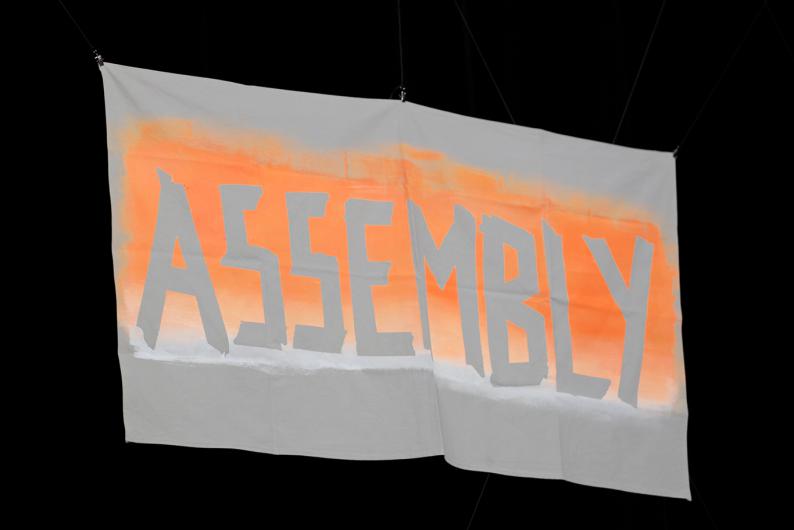Florian Malzacher
Gesellschaftsspiele: The Art of Assembly XXI
The subversive Power of Music with Phil Collins, Anne Hahn & Reyhan Şahin aka Lady Bitch Ray
Music is biggest business and at the same time a space for revolt against the status quo, the regulations and constraints of society. This edition of The Art of Assembly looks at the dissident side of music, how it can suggest alternative ways of living, create identities and foster feelings of belonging and support. Author Anne Hahn organized in punk concerts in the GDR, lost her study-permission and later was imprisoned: East German sub-cultures were one of the few ways to carve out a bit of freedom within the system. For visual artist Phil Collins, who grew up in the North of England in the ’70s and ’80s, clubbing has always been political. He organised a disco-dance marathon in Palestine, worked with fans of The Smiths across three continents, and recently released a benefit album of house music recorded with formerly incarcerated individuals. Linguist and author Reyhan Şahin aka Lady Bitch Ray – the most prominent and controversial female rapper in German language – lost her journalistic job fifteen years ago over lyrics that were considered as too sexually explicit. With her songs and writings, she fights against racism, sexism and discrimination – and has proved that hard rap and feminism may well go together.
 Visit art-of-assembly.net for videos, podcasts and background info
Visit art-of-assembly.net for videos, podcasts and background info
Gesellschaftsspiele. The Art of Assembly is a series of lectures and conversations on the potential of assemblies in activism, art and politics hosted by Florian Malzacher. Former and future guests include Judith Butler, Jodie Dean, Radha D`Souza, Didier Eribon, Max Haiven, Oliver Marchart, Alia Mossallam, Chantal Mouffe, Sibylle Peters, Milo Rau, Oliver Ressler, Jonas Staal & Dana Yahalomi. The series is produced by brut Wien, in cooperation with Münchner Kammerspiele, Wiener Festwochen and Volksbühne am Rosa-Luxemburg-Platz.
About The Art of Assembly. Lectures, discussions, online platform
Whether in Tunis, Cairo, Madrid, or Lisbon, in Athens, New York, London, or Istanbul, in post-Fukushima Tokyo, in the midst of Niemeyer’s iconic parliamentary architecture in Brasilia, under the umbrellas of Hong Kong, or on the streets of Minneapolis: social and political movements of recent years have often been characterised by their search for alternative forms of gathering, of arguing and making decisions, of negotiating community and society. The potential of these assemblies lies in more than just the demands they put forward; many of them change reality merely by practicing radical models of democracy.
The arts have also shown a renewed interest in concepts of gathering and creating public spheres in which society is not only mirrored but constantly tried out, performed, tested, reimagined, or even reinvented. There are court hearings on artistic freedom, religion, and censorship; tribunals on exploitation and violence; summits on climate change or cultural policy; parliaments allowing those who are usually silenced to speak... Theatre in particular has become a stage for assemblies on the fine line between art and reality, a democratic arena of radical imagination.
But what is the future this concept of gathering has ahead of it after months in a state of emergency that has thrown pretty much all areas of social life out of step? Gesellschaftsspiele: The Art of Assembly brings together protagonists from various fields of art, politics and theory to speculate on the future of assembly in a time of experiencing that nothing is certain – a time in which every form of physical togetherness has become precarious.
Florian Malzacher is a curator, dramaturg and writer. 2013-2017 he was artistic director of Impulse Theater Festival (Cologne, Dusseldorf and Mulheim/Ruhr), and 2006–2012 co-programmer of the multidisciplinary arts festival steirischer herbst (Graz). He (co-)curated e.g. the 4th and 5th International Summer Academy (Mousonturm Frankfurt, 2002 and 2004), “Dictionary of War” (2006/07), “Truth is concrete” (Graz, 2012), “Artist Organisations International” (HAU Berlin, 2015), “Appropriations” (Ethnological Museum Berlin, 2014), “Sense of Possibility” on the occasion of the 100th anniversary of the revolution (St. Petersburg, 2017), “Training for the Future” (Ruhrtriennale 2018/19 with Jonas Staal), “After Supervising the Machinery” (2020). As a dramaturge he worked with artists like Rimini Protokoll (DE), Lola Arias (ARG), Mariano Pensotti (ARG), and Nature Theater of Oklahoma (USA). Florian Malzacher has edited and written numerous essays and books on theatre and performance and on the relationship between art and politics. His latest publications include Gesellschaftsspiele. Politisches Theater heute im Alexander Verlag Berlin. florianmalzacher.tumblr.com
The Art of Assembly is based on
Florian Malzacher. Gesellschaftsspiele. Politisches Theater heute. Berlin: Alexander Verlag, 2020.
Credits
With Judith Butler,Oliver Marchart, Chantal Mouffe, Antonio Negri, Sibylle Peters, Julia Ramírez-Blanco, Milo Rau, Oliver Ressler, Dana Yahalomi / Public Movement, Jodi Dean, Jonas Staal u. v. m. Kuratiert von Florian Malzacher. Eine Produktion von brut – Koproduktionshaus Wien GmbH. In Kooperation mit Goethe Institut – Performing Architecture, Münchner Kammerspiele, Wiener Festwochen, Kunsthalle Wien, Volksbühne (Berlin), BIT Teatergarasjen (Bergen), Theater Neumarkt (Zürich), NT Gent.
Dates & Tickets
Registration is only necessary for attending the event at brut nordwest. The livestream is accessible without registration at brut-wien.at.
December 2022
Pay as you wish on site / registration via the ticket button
brut nordwest / Online livestream: brut-wien.at
Nordwestbahnstraße 8-10, 1200 Wien
Downloads
Evening programme Gesellschaftsspiele The Art of Assembly XXI (PDF)








